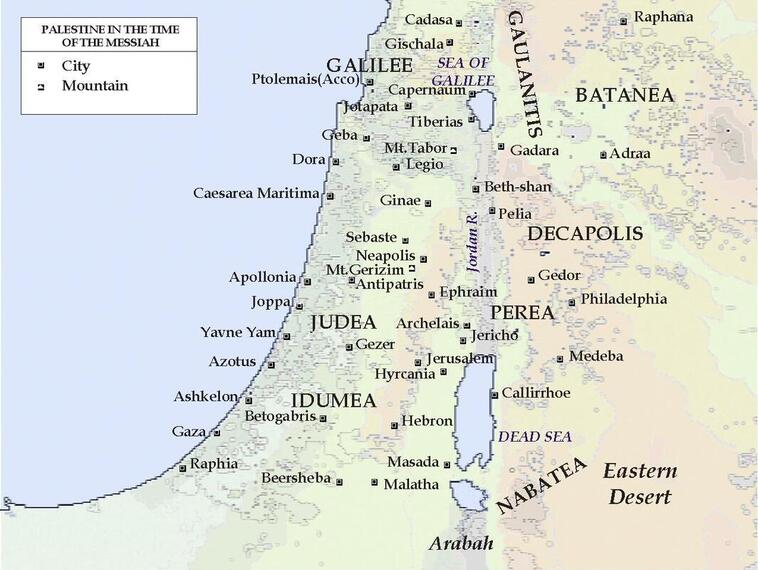The Gospel According to St. Mark
The King James Bible
|
Mark: 7:24-37
Jesus goes to the Gentiles 24 And from thence he arose, and went into the borders of Tyre and Sidon, and entered into an house, and would have no man know it: but he could not be hid. 25 For a certain woman, whose young daughter had an unclean spirit, heard of him, and came and fell at his feet: 26 The woman was a Greek, a Syrophenician by nation; and she besought him that he would cast forth the devil out of her daughter. 27 But Jesus said unto her, Let the children first be filled: for it is not meet to take the children's bread, and to cast it unto the dogs. 28 And she answered and said unto him, Yes, Lord: yet the dogs under the table eat of the children's crumbs. 29 And he said unto her, For this saying go thy way; the devil is gone out of thy daughter. 30 And when she was come to her house, she found the devil gone out, and her daughter laid upon the bed. 31 And again, departing from the coasts of Tyre and Sidon, he came unto the sea of Galilee, through the midst of the coasts of Decapolis. 32 And they bring unto him one that was deaf, and had an impediment in his speech; and they beseech him to put his hand upon him. 33 And he took him aside from the multitude, and put his fingers into his ears, and he spit, and touched his tongue; 34 And looking up to heaven, he sighed, and saith unto him, Ephphatha, that is, Be opened. 35 And straightway his ears were opened, and the string of his tongue was loosed, and he spake plain. 36 And he charged them that they should tell no man: but the more he charged them, so much the more a great deal they published it; 37 And were beyond measure astonished, saying, He hath done all things well: he maketh both the deaf to hear, and the dumb to speak. |
Margin notes:
"Would have no man know it." (7:24) - "Hoped no one would know it." "The woman was a Greek." (7:26) - Greek is another name for Gentile, a non-Jew. "Syrophenician." (7:26) - A person from Canaan, a Canaanite. Since Canaan was located between Syria and Phenicia, it was sometimes called Syrophenicia. "She besought him." (7:26) - Means, "She begged Him." "It is not meet to take the children's bread." (7:27) - "It is not right to take the children's bread." The children Jesus is referring to are God's chosen people, Jews. "Children's crumbs." (7:28) - "Children's leftovers." "They beseech him." (7:32) - "They begged Him." "Ephphatha." (7:34) - Aramaic for "be opened." Notice how Mark translates for his Gentile readers. Proof he was not writing strictly for a Jewish audience. "Straightway his ears were opened, and the string of his tongue was loosed." (7:35) - "Immediately he could hear and speak." "He charged them." (7:36) - "He warned them." Jesus told the witnesses to His miracle not to tell anyone, just as He told Jairus after resurrecting his daughter (Mark 5:43). "He maketh both the deaf to hear, and the dumb to speak." (7:37) - As prophesized in Isaiah 35:5. |
You can read more about the Canaanite woman in Matthew 15:21-28 (lesson 31).
New Living Translation
Mark: 7:24-37
The Faith of a Gentile Woman
24 Then Jesus left Galilee and went north to the region of Tyre. He didn't want anyone to know which house he was staying in, but he couldn't keep it a secret.
25 Right away a woman who had heard about him came and fell at his feet. Her little girl was possessed by an evil spirit,
26 and she begged him to cast out the demon from her daughter.
Since she was a Gentile, born in Syrian Phoenicia,
27 Jesus told her, "First I should feed the children-my own family, the Jews. It isn't right to take food from the children and throw it to the dogs."
28 She replied, "That's true, Lord, but even the dogs under the table are allowed to eat the scraps from the children's plates."
29 "Good answer!" he said. "Now go home, for the demon has left your daughter."
30 And when she arrived home, she found her little girl lying quietly in bed, and the demon was gone.
Jesus Heals a Deaf Man
31 Jesus left Tyre and went up to Sidon before going back to the Sea of Galilee and the region of the Ten Towns.
32 A deaf man with a speech impediment was brought to him, and the people begged Jesus to lay his hands on the man to heal him.
33 Jesus led him away from the crowd so they could be alone. He put his fingers into the man's ears. Then, spitting on his own fingers, he touched the man's tongue.
34 Looking up to heaven, he sighed and said, "Ephphatha," which means, "Be opened!"
35 Instantly the man could hear perfectly, and his tongue was freed so he could speak plainly!
36 Jesus told the crowd not to tell anyone, but the more he told them not to, the more they spread the news.
37 They were completely amazed and said again and again, "Everything he does is wonderful. He even makes the deaf to hear and gives speech to those who cannot speak."
This second Bible text from the "New Living Translation" (Tyndale House, Publishers, Wheaton, Illinois) is a paraphrase and not an accurate word for word translation of the Bible. However, it is a helpful tool when read with the "King James Version."
Today's Question:
1. Why would Jesus help a Gentile if He was here for the "children of Israel"? (7:25-30)
Let me know your thoughts and opinions.
1. Why would Jesus help a Gentile if He was here for the "children of Israel"? (7:25-30)
Let me know your thoughts and opinions.
Answer: (Do you agree?)
1. While it's true that Jesus was sent first "unto the lost sheep of the house of Israel" (Matthew 15:24), His message of salvation is meant for everyone. When it came to Jesus' earthly mission, Jews were His first priority (Romans 1:16; 15:8-9), but He did not exclude Gentiles who had faith.
Application thought for the day:
Even though the girl wasn't in his presence, Jesus cast the demon from her. Jesus' power is not limited by time or distance.
1. While it's true that Jesus was sent first "unto the lost sheep of the house of Israel" (Matthew 15:24), His message of salvation is meant for everyone. When it came to Jesus' earthly mission, Jews were His first priority (Romans 1:16; 15:8-9), but He did not exclude Gentiles who had faith.
Application thought for the day:
Even though the girl wasn't in his presence, Jesus cast the demon from her. Jesus' power is not limited by time or distance.
Thanks to the writings and commentary of John Wesley and Adam Clarke. Also, "The Layman's Bible Study Notebook" by Irving Jensen published by Harvest House Publishing, Irvine, California; the "Life Change Series" published by NavPress Books, Colorado Springs, Colorado; the "Life Application Study Bible" published by Tyndale House Publishing, Carol Stream, Illinois; "The Quest Study Bible" published by The Zondervan Corporation, Grand Rapids, Michigan; "Robertson's New Testament Word Studies"; "The MacArthur Bible Commentary" by John MacArthur published by Thomas Nelson, Nashville, Tennessee; "Wisdom of the Bible" CD by Topics Entertainment, Inc., Renton, Washington for their inspiring pictures; "My utmost for His Highest" by Oswald Chambers published by Barbour publishing, Inc., Uhrichsville, Ohio; The "Treasury of Scriptural Knowledge" by Reuben Archer Torrey; "Hope For Each Day" by Billy Graham published by J. Countryman, a division of Thomas Nelson, Inc., Nashville, Tennessee; "Easton's Bible Dictionary" by Matthew George Easton; "Unger's Bible Dictionary" by Merrill F. Unger, published by Moody Press, Chicago, Illinois; "Halley's Bible Handbook" by Henry H. Halley, Zondervan Publishing House, Grand Rapids, Michigan; "The Living New Testament" published by Tyndale house; "The New Living Translation" published by Tyndale House; BibleGateway.com for all their wonderful links; and of course the "King James Bible". All were critical in putting these lessons together.
© 2020 evolke
© 2020 evolke




